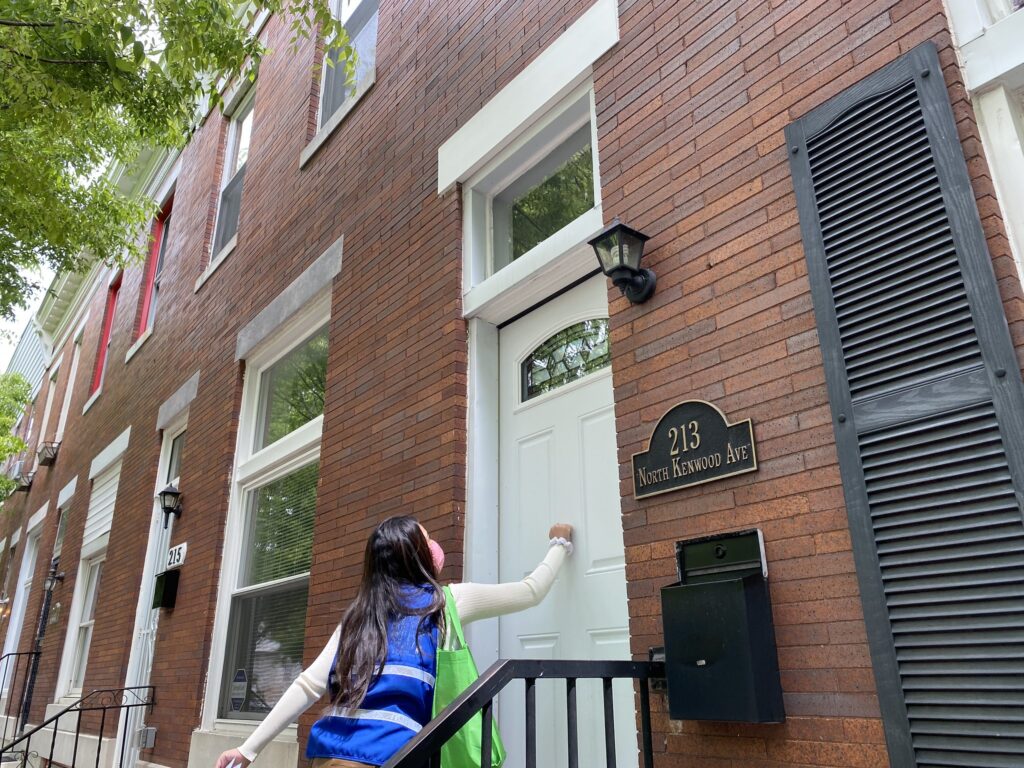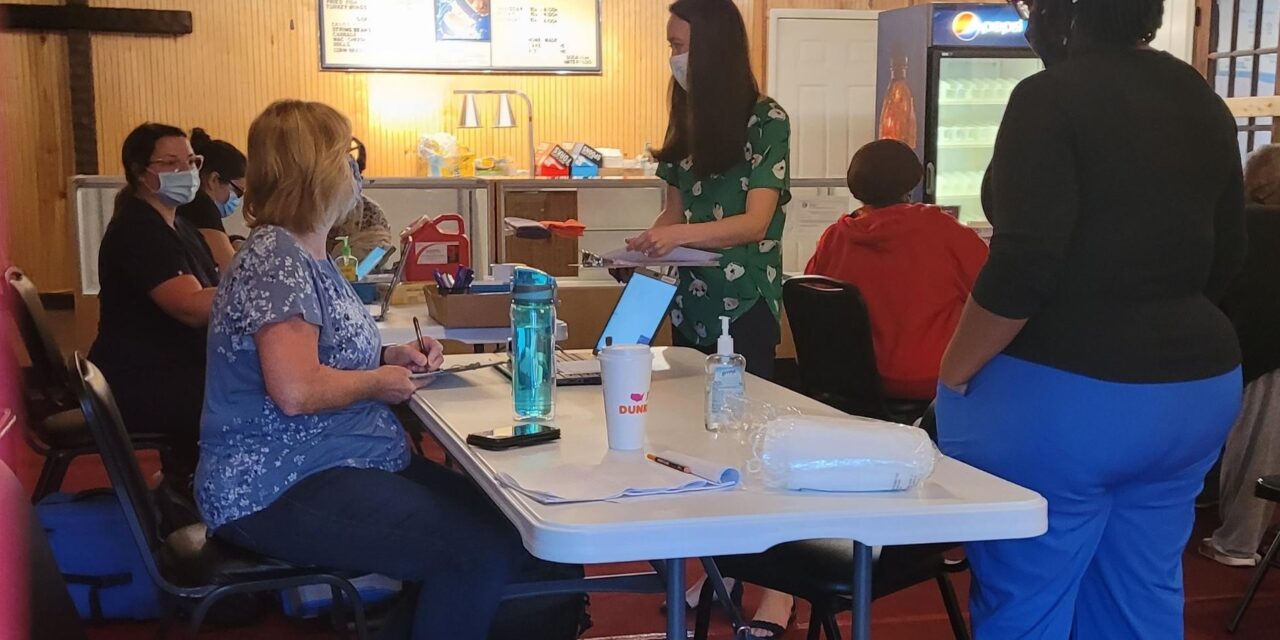Capital News ServiceANNAPOLIS, Md
A $3 million vaccine canvassing program Gov. Larry Hogan announced Sept. 8 is benefiting 26 community groups statewide, and in targeted minority or vaccine-hesitant areas, more unique solutions are bearing fruit.Organizations responded to Maryland Department of Health requests for proposals in June. Awards approved for each group dispersed Aug. 1 and vary from $50,000 to $250,000 to support vaccine clinics and education efforts through June 30.
A number of groups are concentrated in Baltimore City and Prince George’s County, and three groups focus on the Eastern Shore. The furthest west group is based in Frederick; no groups applied from Western Maryland, despite low vaccination rates and high case rates.
Dr. Mark Martin, a health department deputy director, told Capital News Service the chosen groups are diverse, and each one is working across assigned ZIP codes, targeting those where vaccination rates are the lowest.
These organizations have strong relationships with their communities, Martin said. “That little human interaction” in face-to-face outreach helps make the tactic effective.
In Frederick County, canvassing means far more than door-knocking. A continuous stream of clinics at farmer’s markets, church block parties and oddly specific festivals has led to vaccinations for over 2,300 individuals before Aug. 31 since the Asian American Center of Frederick began canvassing in June.
The center organizes one or two events every day, whether it’s a vaccine clinic or an information table, according to the center’s vaccine program project manager, Angela Spencer.
Repeating locations helps: Shoppers at a Latino grocery store know that they can bring family along to get milk, bread and vaccinations twice weekly like clockwork, Spencer said.
The grant funding helps the center pay for some team member salaries, ground signs and giveaways at each table. Visitors are sure to leave with something besides the vaccine: from sunscreen to T-shirts, from coloring books for kids to jar openers for seniors and hand sanitizer above all.

A CASA volunteer knocks on a door in Baltimore to chat with residents about vaccines April 24. (Photo courtesy CASA)
“We forget about those we don’t see on a daily basis,” Spencer said. “Our responsibility is to reach every child, every senior living in a residential living facility and say, ‘Hey. Have you been vaccinated yet? You can get one there and there.'”
For some canvassers, it’s less about having many clinics and more about reaching the out-of-reach.
Bikur Cholim, a Jewish health center tasked with educating and vaccinating residents in Baltimore County, has vaccinated over 8,200 individuals since April, said Vaccine Clinic Director Dena Pollak.
Pollak said their goal isn’t just to combat vaccine hesitancy, but to lift barriers, and bring vaccines to homebound individuals. Although Bikur Cholim was administering shots before the grant, state funding helped the health center expand its mobile vaccination services.
Clinics are held three times a week, sometimes vaccinating hundreds of people a day. On the other hand, the team reaches 12 to 15 homebound individuals a week.
“It’s a different skill set,” Pollak said. “It’s not 500 shots in two hours, it’s one, two shots in two hours. Not as exhilarating.”
Funding has helped Bikur Cholim get more visibility.
“We’ve upgraded from stickers to buttons — which doesn’t sound like a major change, but it is,” Pollak said. Stickers come off after a day, but buttons may stay proudly pinned to purses or backpacks.
Convenience fuels clinic participation in Prince George’s County.
In Hyattsville, the immigrant advocacy group CASA helps a concentrated population of Latino and West African immigrants navigate the state health system. Now, CASA holds vaccine clinics in their neighborhood offices, according to CASA Director of Health and Human Services Michelle LaRue.
Over 11,000 have been vaccinated at clinics in Langley Park, Silver Spring and Baltimore offices since March. LaRue said it was “critical” that offices are in neighborhoods, so many people just walk in on their way home from work.
"Our community doesn't have the luxury of working from home or paid sick leave." If getting the shot means taking the day off without pay, LaRue said, that month's finances could be jeopardized.
CASA holds some of its vaccine clinics in the evenings, and their biggest rush is Friday through the weekend, when a day to recover from side effects may coincide with a day off.
State funding helped CASA pay for staff training. CASA volunteers guide individuals through the entire vaccine process, from explaining the importance of the vaccine card to registering them for their second doses, all in Spanish or French.
LaRue said that the state vaccine registration website has many attached challenges. Many community members may not have internet at home, and the site is only available in English.
"Our goal is to get to where there's no one left to vaccinate," LaRue said.
Vaccinations do not come so easily in other parts of the state.
In Southern Maryland, LifeStyles of Maryland is focusing on door-to-door canvassing, attempting to bond with, educate and pre-register for vaccine appointments 40 households a month. In August, they reached 33 households, according to Debborah Collins, a community health worker.
"We bring education to the households, then they come to us for vaccines," Collins said. "We have to gain the trust of the people, you know? If they don't know you, they haven't seen you — it's harder to gain their trust."
In Eastern Maryland, hesitancy about the shot and transportation issues are bigger problems.
Eastern Shore Wellness Solutions in Cambridge is tasked with covering both Dorchester and Queen Anne's counties, but has a three-person team, said company President Ashyrra Dotson.
"We spend two, maybe three days a week canvassing, depending on the area," Dotson said. Her strategy is canvas, then clinic: six clinics have garnered 41 vaccinations.
To remove obstacles to vaccinations, the wellness center has a transportation provider to help get individuals to clinics, as well as minimal child care services while parents wait the 15 minutes required after shots.
Greater New Hope church in Preston has had less luck with Caroline County. The team is still planning its first state-funded clinic.
Although the team would like to vaccinate about 100 people by next summer, spreading knowledge to those averse to the vaccine has been the team's focus, said Director of Programs Savannah Winston.
"It's down to individual choice. They have to make the decision," Winston explained. "Sometimes they just don't make that decision because they're not educated (about the vaccine)."
The third Eastern Shore group doesn't have as many issues reaching people to vaccinate.
Aaron's Place, a food pantry in Preston, has had about 10 clinics, said executive director Cheryl Beulah last week, and at one event, she was able to help register 21 families for vaccine clinics.
In spread-out Caroline County, services must either go to the customer or bring the customer to the service — Beulah chose the latter and targeted those already coming to the pantry.
"Come with us and we'll give you a box of food!" Beulah exclaimed.
When individuals show up at one of the pantry's four locations, they're able to have a conversation about the vaccine and register for one while they wait in line for a box of food.
Beulah said she couldn't have nearly as much outreach before the state grant.
"I probably wouldn't have even talked to them, just put literature in someone's box," she said.





Recent Comments